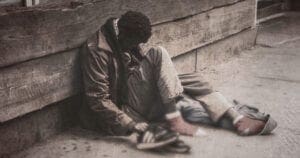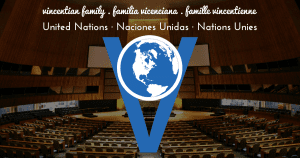With the COVID-19 Pandemic uniting the world in abject pain, some of the most vulnerable are finding the situation extremely difficult to navigate. Our homeless sisters and brothers find themselves being left behind once again. The Working Group to End Homelessness is a working group formed by the Vincentian Family at the UN a few years ago, and we remain active members of this important working group.
 At our last monthly meeting, via Zoom, the education committee presented a front row look at the homeless in New York City. I would like to share that report with you today. In New York City there are more than 79,000 people currently without a home. On any given night at least 4,000 people are sleeping on the street, in the subway system or other public spaces. The city shelter system serves over 59,000 at 450 sites, while faith-based shelters accommodate thousands. This was prior to the COVID-19 pandemic.
At our last monthly meeting, via Zoom, the education committee presented a front row look at the homeless in New York City. I would like to share that report with you today. In New York City there are more than 79,000 people currently without a home. On any given night at least 4,000 people are sleeping on the street, in the subway system or other public spaces. The city shelter system serves over 59,000 at 450 sites, while faith-based shelters accommodate thousands. This was prior to the COVID-19 pandemic.
Since COVID started attacking NYC many changes have occurred. ALL the faith-based shelters have suspended services temporarily. The city shelters, historically over-crowded, have reached the breaking point. Social distancing is virtually impossible in the shelters.
The MTA has started an extensive cleaning and disinfecting program on all trains each night which requires the removal of all homeless people who may have otherwise found shelter for the night on the trains. As the police removed the people from the trains, they offered a place to sleep in city shelters, causing the already overcrowded shelters to overflow to dangerous levels. The NY Post recently ran an article highlighting the crisis at the Bellevue Men’s shelter, they reported men sleeping on the cold tile floors, pushed up against each other, many without masks.
With rapid changes to the safety of an already vulnerable population, we decide we might take a close look at the current situation in NYC. I was able to contact the staff at a Drop-in Center I have worked with for years to arrange interviews with two men staying at the center now, and two members of the staff.
All were asked the same questions:
- How are you?
- What would you like to say to the United Nations? The government?
- What would you say is your biggest challenge now, amid COVID-19? And your greatest strength?
- Are you finding people on the street treating you in the same way as always, or are they being any accepting?
- Are you getting enough to eat?
- Is there anything else you would like to share with us?
Here are their replies.
From Sue, the Respite bed coordinator
- We’re doing well, thank you for asking.
- Thank you for allowing me to speak with you. We’re getting great support from the city, and donations, although we always need more. Everyone is trying to solve the homeless issue. The money people don’t always see the people behind the numbers, it’s a battle. Please make sure to include the homeless at the table as you’re working to solve the issue.
- Biggest challenge is trying to stay safe; some clients are non-compliant regarding wearing masks and hand washing, Strength: clients have been very adaptive to changes; they stay inside all day watching TV, movies, etc. The staff has been organizing more groups to help the clients.
- N/A to Sue
- Also, N/A to Sue, although she did tell me the drop-in center is now serving three meals a day, and snacks. The chef made brownies for Mother’s Day, against the city rules! ?
- The city is being annoying, asking for virtual tours of the center, pressuring them on the numbers in the center, saying they want to get folks into housing, but everything is closed. There is a disconnect.
From Anthony, Assistant respite bed coordinator
- We’re well.
- Be safe! We’re doing everything we can for the clients and ourselves. We’re supplying masks and gloves.
- Challenge: Keeping the clients calm, and from fighting. If one person coughs the others go wild! They want us to separate that person, move them away from everyone else. Sometimes we do separate a cougher if need be. Strength: our staff, they have been great! Keeping sensible and even keeled. They have been even more busy than usual, taking temperatures 3 x a day, making sure everyone has gloves and masks.
- N/A
- N/A
- Thank you for listening to us.
From Dwight, A man homeless for four months
- I’m doing well, thank you.
- We have been allowed to drop through the cracks in the past and we would like this not to happen with COVID-19. We’re the most vulnerable.
Q: How can we avoid this?
A: Provide us with the basics. Help us to help ourselves. We want everything to return to normal and we want to help with that, as fellow citizens. We’re still not being heard, we’re part of society. Help us to contribute, allow us to contribute.
- Challenge: shut down made everything harder, trying to get housing became more difficult because everything is shut down. Strength: Sense of community. People are united, those who would not otherwise be part of your life are now part of your life.
- Yes, everyone is careful of those not in their circle, but we don’t stand out.
- Food has been no problem.
- Yes, thank you for allowing me to speak.
From Arthur, a 63-year-old man currently homeless since November 20th, previously homeless for two years after a failed marriage. Clean and sober 15 years.
- I’m doing fine. I’ve been homeless before for two years after a failed marriage.
- More than anything the fact that I am no different than any other working person, anyone can fall into this pit. I represent everyone. Everything is shut down, I thought this would be temporary, it’s lasting longer than I expected.
- Challenge: Dealing with other attitudes, other people I come in contact with. I just have to stay focused, keep on the goal. It’s not always productive, can cause you to have bad days. Strength: I’m a born-again Christian. 15 years clean and sober. I pray every day; it brings me through.
- People can have an idea you’re not stable if you’re walking around with your winter coat on, etc.
- Food has been good. We also have showers, case workers, all the donations are still strong, we were recently given boots.
- Thank you for allowing me to speak.
These four people were generous and truthful with their answers. Each were happy to have a platform, a soapbox from which to share their concerns.
One important point is that the people staying at the drop-in center would normally be sent to a faith-based shelter, were the atmosphere is generally calm and inviting, unlike the city run shelters. They would have been given a hot dinner and offered a bed in which to rest their head. Under the circumstances, they are spending their nights, trying their best to sleep in chairs. No beds available.
Interviewing them was a gift. I appreciated their candor, and their spirit.
Pattie Hughes, SSVP at the United Nations






Thank you, Pattie, for creating a way for these brothers and sisters to share their reality to us.